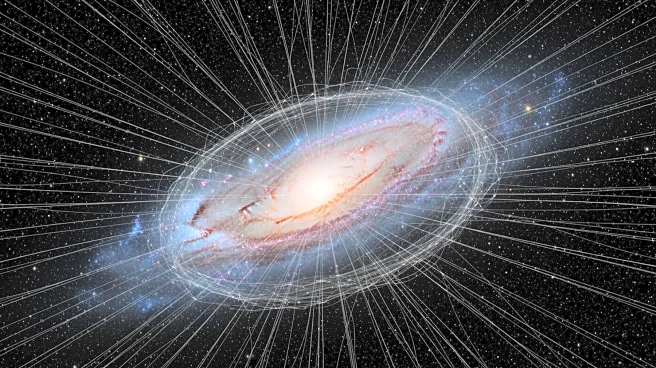What's Happening?
A dwarf galaxy, AGC 727130, located nearly 100 million light years away, is experiencing a significant loss of its star-forming gas due to the cosmic web. This phenomenon, observed by Nicholas Luber and his team at Columbia University using the Very Large
Array in New Mexico, involves the galaxy's gas being pulled away by ram pressure stripping. This process occurs as the galaxy moves through an intragalactic cloud, part of the cosmic web, leaving its gas behind and halting star formation. The galaxy is situated at the intersection of several cosmic web filaments, which intensifies the stripping effect. This discovery is notable as it provides a rare glimpse into the interaction between galaxies and the cosmic web, a process that is difficult to observe due to its gradual nature.
Why It's Important?
The stripping of gas from AGC 727130 by the cosmic web highlights a critical aspect of galactic evolution and the challenges in observing such phenomena. This event sheds light on the 'missing satellite problem' in cosmology, where fewer dwarf galaxies are observed than predicted by models. Understanding these interactions can help bridge the gap between theoretical models and actual observations. The rarity of such events, especially outside the influence of larger galaxies, underscores the significance of this discovery. It suggests that the cosmic web plays a more active role in galaxy evolution than previously understood, potentially affecting the distribution and formation of galaxies across the universe.
What's Next?
Future observations with large radio telescopes, which are set to release new maps of gas across the universe, could provide further insights into the role of the cosmic web in galaxy evolution. These studies may reveal more instances of galaxies being quenched by the cosmic web, helping to refine cosmological models and improve our understanding of the universe's structure. Researchers will continue to explore the implications of these findings, potentially leading to a reevaluation of how galaxies interact with their environments on a cosmic scale.
Beyond the Headlines
This discovery also raises questions about the long-term impact of the cosmic web on galaxy formation and the potential for similar processes occurring in other parts of the universe. The ethical and philosophical implications of understanding our universe's structure and evolution could influence future scientific inquiries and the way we perceive our place in the cosmos.
















